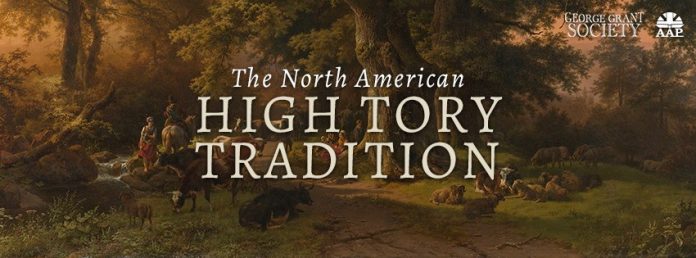Being a Tory used to mean so much more than adhering to the staunch belief in capitalism and self-sustainability that has commandeered the conservative ideology. Why do some modern conservatives feel at war with their ethics and Christian values? How have industry and independence become the darlings of a political group that subscribes to a religion of acceptance and understanding? Can modern Tories look toward their past in order to realign with their values? This is the question that Ron Dart, associate professor of political science at UFV, asks in his new book, The North American High Tory Tradition.
Dart is a firm believer that wisdom is garnered through history. “If we see farther than our ancestors,” Dart writes, quoting the 12th-century theologian John of Salisbury, “then it is because we stand on the shoulders of giants.” Dart uses this philosophy to draw inspiration from Canadian philosophers and political commentators to present a manifesto of what it means to be a Christian and a conservative in Canada.
20th-century Canadian philosopher George Grant is a major figure in Dart’s work. In 1965, Grant penned one of Canada’s most biting criticisms of modern conservatism, Lament for a Nation, which Dart uses to reinforce his message. As a philosopher, building from the crystallized work of historical figures is paramount to progress, but as an author, drawing a comparison to someone as gifted as George Grant can be detrimental.
The language in Dart’s book lacks personality at times. The narrator’s voice is authoritative when declaring a fact or recounting history but becomes flowery and loose when delving into exposition. “The ecclesial journey into the future must surely oppose both fragmentary forces at work in modern and postmodern forms of Christianity that erode, yet further, the centre and the increasing fragmentation that so defines and besets liberal modernity,” Dart writes.
When compared to the raw authenticity of Lament for a Nation and the strong prose of George Grant, Dart isn’t so much standing on the shoulder of a giant as he is struggling in the shadow of one.
That isn’t to say Dart hasn’t accomplished a great feat in his own right. The North American High Tory Tradition succeeds in bringing the conversation on North America’s founding ideology into modern times. U.S. republicans and Canadian conservatives are reeling from political party leaders like George Bush and Stephen Harper, leaders who, as Dart argues, represent the antithesis of traditional Tory values. Coinciding with a catastrophic American election for the U.S. Republican Party, the timing of Dart’s literary scrutiny of conservatism is impeccable.
The depth of research involved in crafting The North American High Tory Tradition is impressive. Dart’s life’s work has formed him into the premier authority on Tory ideology. Ron Dart has garnered himself a position in the ranks of great modern Canadian non-fiction authors such as Naomi Klein.
“[Canadians] must be wary of any public agenda that reduces the political vision of the church to the ideology of the right, left or centre,” reads the final chapter of The North American High Tory Tradition. “It is by articulating a more consistent ethical stance that the church is true to her prophetic calling.”
Anyone battling with the ethics of modern conservatism, interested in Canada’s rich and diverse political history, or contemplating the role of faith in contemporary politics should read Ron Dart’s book.


